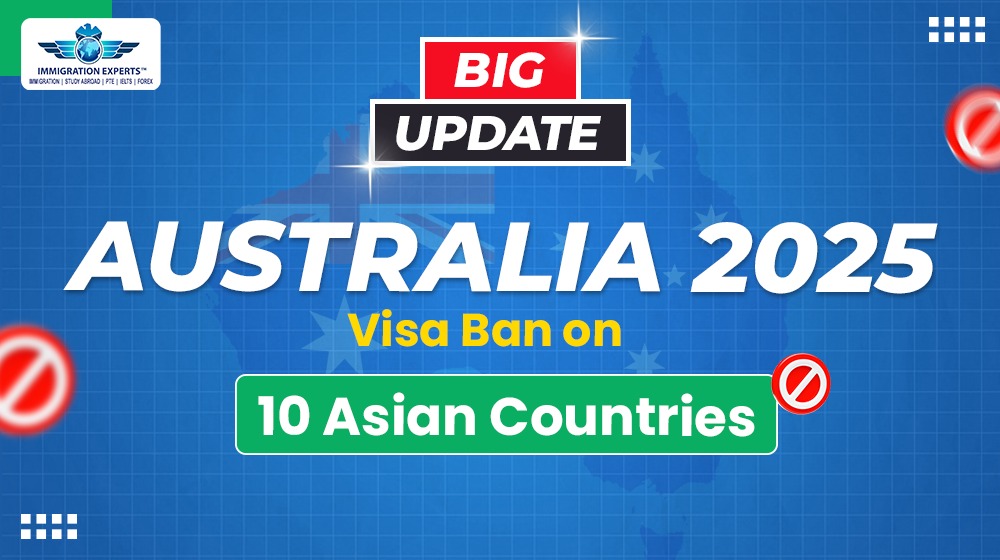
Big Update: Australia 2025 Visa Ban on 10 Asian Countries
Australia has long been a top destination for students, skilled workers, and families seeking better opportunities. Over 1.3 million visitors from Asia arrived annually, contributing to universities, industries, and communities. However, a major policy shift is set to change this landscape. The Australia 2025 visa ban on 10 Asian countries could affect student admissions, workforce supply, and family reunifications unless exemptions are provided.
This move has sparked international attention and debate. While the Australian government cites national security and immigration compliance as reasons, critics argue the policy unfairly targets entire populations.
Stay informed about the Australia 2025 visa ban and consult experts if you or your family might be impacted.
Why Australia Is Revamping Its Visa System
Australia’s immigration system is among the most intricate worldwide, balancing temporary visas, skilled migration, and humanitarian intake. In recent years, several challenges have pressured the system:- Visa overstays: Thousands remain illegally after temporary visas expire.
- Fraudulent documentation: Fake financial records, forged transcripts, and sham enrollments.
- National security concerns: Regional instability requires stricter screening.
- Economic pressures: Debates about whether migration affects local job opportunities.
The 2025 policy overhaul represents more than administrative tightening—it signals a shift toward a skills-first migration model, prioritizing high-income professionals while limiting low-skilled or high-risk applicants.
Country-Specific Impact of the Visa Ban
Myanmar: Political Instability Leads to Stricter Borders
Myanmar has long been affected by political unrest, causing thousands to seek refuge abroad. Historically, Australia has welcomed many Myanmar nationals through humanitarian and student visa programs. However, under the new 2025 policy, heightened border controls mean longer screening times, delayed visa approvals, and higher rejection rates.
Reason for restriction: Concerns over false asylum claims and visa overstays.
Impact: Families face separation, and student admissions are deprioritized.
For a nation already coping with displacement crises, these measures could worsen instability and limit legitimate humanitarian support.Vietnam: Student Visa Misuse and Labor Concerns
Vietnam has become a significant source of international students and temporary workers in Australia. Reports of undocumented employment and fraudulent visa applications have prompted authorities to tighten oversight.- Agriculture and construction sectors have seen misuse of student and tourist visas.
- Universities dependent on Vietnamese enrollments may face financial shortfalls.
Thailand: Tourism Partner Faces Increased Scrutiny
Thailand, historically a strong tourism and trade partner, is under review due to patterns of visa misuse.- Tourist visas are frequently used for informal work.
- Unlicensed agents have exploited applicants, contributing to fraud.
- Informal labor threatens wage protection in hospitality and caregiving sectors.
Sri Lanka: Economic Hardship Meets Policy Tightening
Sri Lanka’s economic crisis has led to increased asylum claims and visa overstays. While many are legitimate, authorities report rising cases of false documentation and sham student enrollments. Impact:- Genuine students experience longer processing delays.
- Families seeking stability may face outright visa rejection.
Nepal: Rising Student Numbers Under Scrutiny
Nepal has rapidly grown as a source of students for Australian institutions. Yet misuse of education visas has prompted new restrictions.- Many students leave studies for low-skilled jobs.
- Fake documentation and sham enrollments are increasing.
- Visa overstays pose silent compliance risks.
Indonesia: Strong Ties, Stricter Oversight
Despite robust diplomatic and trade relations, Indonesia is facing closer scrutiny due to visa misuse.- Tourist and visitor visas often lead to informal employment.
- Reliance on fraudulent agents erodes trust.
- Informal labor challenges Australia’s skills-based migration goals.
Bangladesh: Visa Compliance and Documentation Issues
Bangladesh, with a long-standing diaspora in Australia, is now subject to new restrictions.- Overstays and asylum claims are flagged as high-risk.
- Concerns over falsified financial and academic documents are rising.
- Genuine students and workers may face delays or rejection.
Pakistan: Security Concerns Drive Policy
Pakistan’s inclusion is particularly sensitive due to its strong contribution to education and the workforce in Australia.- Verification of academic and financial records is challenging.
- Overstays and unauthorized employment are on the rise.
- Geopolitical tensions increase scrutiny.
Philippines: Key Workforce Under Restrictions
Filipinos make up a significant portion of Australia’s migrant workforce, especially in healthcare, caregiving, and hospitality. Yet in 2025, even this essential workforce faces restrictions.- Increase in overstays through vocational education pathways.
- Exploitation by fake recruitment agents.
- Australia prioritizes high-skilled, high-income migrants over semi-skilled roles.
India: The Largest Impact
India, Australia’s top source of international students and migrants, faces the most severe restrictions.- Rising cases of visa overstays and fraud.
- Volume of applications overwhelms processing capacity.
- Authorities focus on STEM and healthcare, sidelining lower-tier applicants.
Humanitarian Concerns
While the government frames these changes as economic and security-focused, the human cost is substantial. Families may be separated, students denied opportunities, and legitimate workers rejected. Experts warn that blanket restrictions could undermine Australia’s humanitarian commitments.Economic Implications
Australia’s education sector generates over AUD 40 billion annually, much of it from Asian students. The 2025 visa ban could:- Reduce international student enrollments
- Shrink labor in caregiving, hospitality, and construction
- Affect bilateral trade and economic growth
Global Migration Trends
Australia’s policy may set a precedent for other wealthy nations, signaling a shift from humanitarian responsibility to selective, skills-based migration. OECD reports highlight increasing global preference for high-skilled migration over vulnerable populations.Conclusion: A New Era of Migration Policy
The Australia 2025 visa ban on 10 Asian countries is more than a policy update—it’s a paradigm shift. By restricting Myanmar, Vietnam, Thailand, Sri Lanka, Nepal, Indonesia, Bangladesh, Pakistan, the Philippines, and India, Australia is prioritizing skills and compliance over humanitarian leniency.
For migrants, this is a life-changing challenge. For universities, industries, and international partnerships, it signals potential economic disruption.
Stay updated on the latest rules, exemptions, and advice to navigate the 2025 visa changes. Consult immigration experts to protect your future opportunities in Australia.
- Email: info@immigrationxperts.com
- Call us: +91-9999467686, +91-8447-696555





